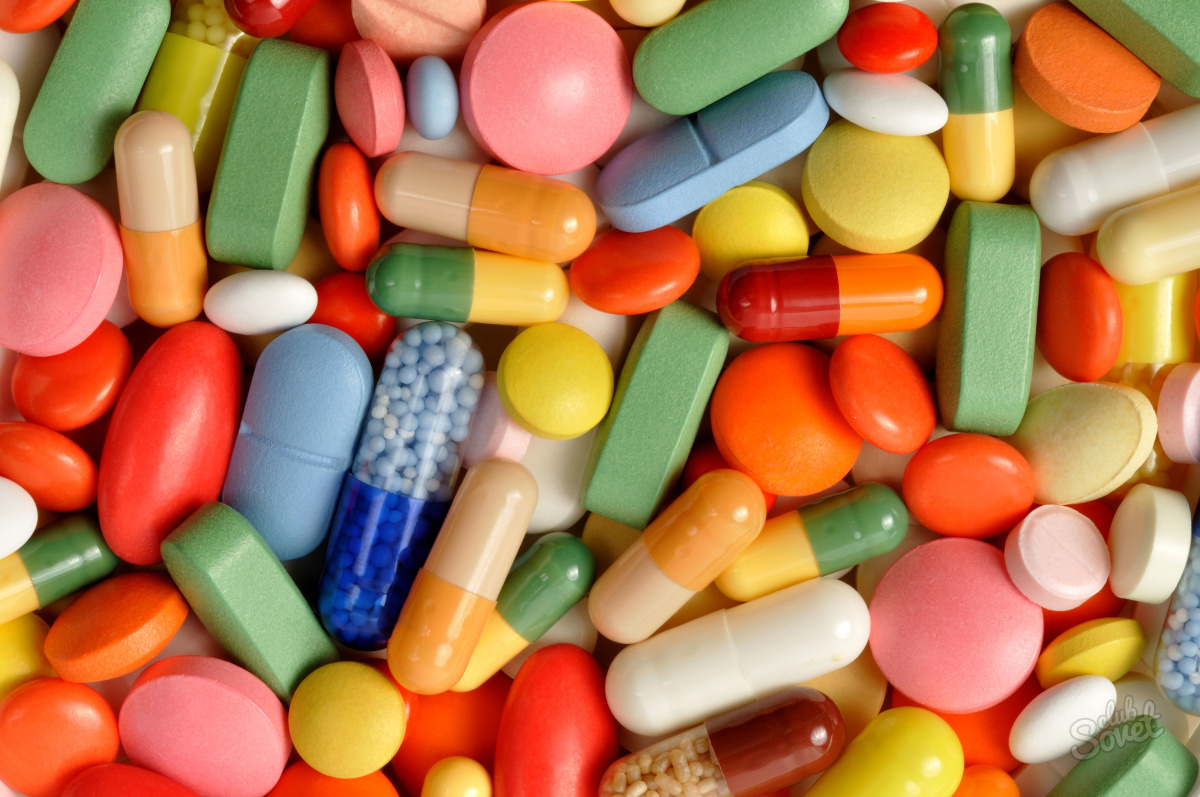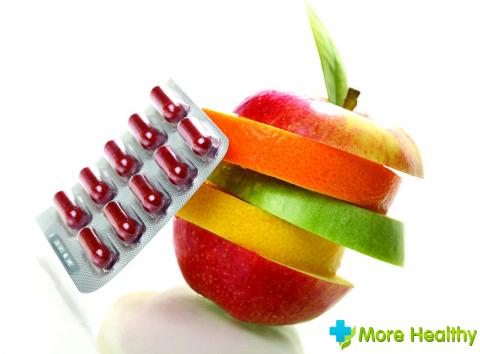Daily norm of vitamins and microelements for men. What is important to know about vitamin-mineral complexes. Fat-soluble vitamins: description and norm
The body needs vitamins at any time of the year, and not just in winter and spring. They can be taken both purposefully, replenishing the necessary deficiency, and for preventive purposes, to avoid diseases and problems associated with their deficiency. Eating fruits, vegetables and other healthy products, you will not be able to get all the vitamins in full, so it is recommended to take vitamin complexes. The composition of the complexes can be varied and selected according to several criteria: gender, age, physical exercise and various diseases and allergies. It is very important to know the required daily intake of vitamins in order to avoid an overdose, which can adversely affect your health. Here are a few essential vitamins and their daily requirements for a typical adult.
Our food contains only small amounts of folic acid. Experts recommend daily dietary supplements containing 400 mcg of folic acid, especially for women of childbearing age, to prevent birth defects. Older adults can also test their blood folate levels to detect possible deficiencies.
Water-soluble vitamins: description and norm
Patients with active inflammation usually present with symptoms of anemia and low level gland. Because some rheumatism medications cause the body to lose iron through the intestines, anemia may well occur. But when taking iron tablets, caution is recommended for patients with rheumatic diseases, since the microelement can further stimulate the inflammatory process. However, diet can help reduce general inflammation and thereby improve anemia.
- B1 - thiamine, improves the nervous and cardiac systems, helps muscle growth. The daily dosage of thiamine is from 2000 to 2500 mcg. Get it from cereals, cabbage, potatoes, beer and legumes.
- B2 - riboflavin, good for the eyes, nerves, heart and protects against harmful UV rays. About 1500-2000 mcg per person is required per day. You will find this vitamin in nuts, green peas, cheese and eggplant.
- B3 – niacin, improves protein metabolism during digestion, improves the quality of heart function, and relieves depression. The daily dose for an adult is about 1400-1800 mcg; pregnant and breastfeeding women can increase this intake by 500 mcg. B3 is found in white meat, fish, mushrooms, green peas and peanuts.
- B6 - pyridoxine, reduces cholesterol, thins the blood, strengthens the immune system. The daily intake of this essential vitamin is, on average, from 1500 to 2500 mcg. Pyridoxine is present, most of all in spinach, sprouted grains, berries, legumes, meat and fish products, and liver.

Very high level blood increased overall mortality in older adults, while increased, desirable blood levels could reduce mortality in older adults by 50%. Osteoporosis is a regular episode of inflammatory rheumatic diseases that must be prevented from the start with a bone-friendly diet. Vitamin C promotes bone maturation and formation and increases calcium absorption from the intestines.
Daily value for newborns
Blood levels of folic acid also appear to influence bone density. But bones also need adequate mineral intake. Although calcium makes up 20 percent of bone mass, it is the most important mineral for bone health. Numerous other minerals such as boron, copper, manganese, silicate, strontium, fluoride and phosphorus are essential for bone health. However, a healthy diet provides sufficient amounts of these minerals.


The excretion is zinc, which is important for the formation of bone matter and is often found too little in food. Olaf Adam is a physician and nutritionist specializing in metabolism and nutrition, and President of the German Academy of Nutritional Medicine. He headed the nutrition department at the Ludwig Maximilian University in Munich for many years.
Nutritionists can only estimate the amount of vitamins a person needs
Vitamin tablets: empty promises. Vitamins are vital, but the logic that you get healthier the more pills you swallow doesn't work. Against. “If vitamins are added to food or taken in tablet form, adverse effects cannot be ruled out. side effects" says Hoffmann. However, only artificially created vitamin preparations pose a danger, not fruits and vegetables. "When food is ingested, it is usually not possible to overdose on vitamins, so you don't need to worry," says the researcher.

Stock up on vitamins before important events in life, on vacation and in the summer, when there are a lot of fruits and vegetables, eat properly and balanced. Only harmony in the body and head will make you healthy and full of vital energy, and vitamins will help maintain this harmony at all levels.
It is proven that vitamin-rich foods such as fruits, vegetables and whole grains are healthy. For another reason, real foods should be preferred for vitamin supplements: “Not only food contains vitamins, but also hundreds of other substances that are sometimes unknown,” says Bernhard Watzl, who studies nutritional physiology and biochemistry at the Max Rubner Institute: “Probably these different substances in the body interact in very complex ways because you know so little.”
For infants, a daily dose of 500 units is recommended from the fifth day of life until one year. This usually equates to one tablet - talk to your pediatrician! This improves blood clotting and helps avoid cerebral hemorrhage. Women who are pregnant should take 400 mcg of folic acid daily after consulting their doctor. The vitamin prevents “open back” in a child and spinal malformation.
For the normal functioning of all systems and internal organs The body must receive a sufficient amount of vitamins and minerals. A deficiency of nutrients leads to a malfunction of organs, which can cause the development of diseases.
Content:
Dietary supplements are legally considered food, not drugs, so they are not tested for possible side effects. Anyone who wants to take them should not exceed the recommended dose. Many substances interfere with the body's ability to absorb drugs, such as calcium and iron. High dose multivitamin foods may even interact with chemotherapy drugs in cancer treatment.
How much fruit and vegetables you should eat is not yet clear. The starting values for a number of vitamins - that is, how much you should eat from them daily, if possible - are therefore estimates only. They were generously provided and varied from country to country. In any case, they do not constitute a request to swallow additional vitamins in tablet form. Today, scientists recommend that healthy people take vitamin supplements entirely.
Water-soluble vitamins: description and norm
These vitamins have the ability to dissolve in water. Most make up group B. They have antioxidant properties and enhance the effect of other substances.
Water-soluble vitamins include:
- Vitamin C (Ascorbic acid). The most powerful antioxidant. Participates in the synthesis of collagen, which protects joints, bones, blood vessels, muscles and organs. The vitamin increases the body's protective functions, helps normalize cholesterol levels and reduce blood sugar. prevents the formation of wrinkles and stretch marks.
- Dose for healthy person per day is 50-60 mg, and for children - 30-45 mg.
- B1 (Thiamin). Helps normalize the functioning of the intestines, heart, liver and nervous system. Thiamine takes part in carbohydrate metabolism and activates mental activity. B1 is necessary for the normal growth and development of a child. The daily requirement for children is about 0.3-0.6 mg, for adults – 1.1-1.9 mg.
- B2 (Riboflavin). With sufficient vitamin content, the skin is firm and elastic. Riboflavin is involved in energy, carbohydrate and protein metabolism. Has a direct effect on the organs of vision.
- Adults should consume at least 1.4 mg and no more than 3 mg of B2 per day, and 0.4-1.2 mg for children.
- B3 (Niacin). Improves the functioning of the digestive system, helps normalize cholesterol levels, and reduces headaches. The daily value of B3 for adults is 12-25 mg, for children it is in the range of 6-21 mg.
- B5 (Pantothenic acid). Increases immunity, stimulates the work of the heart muscles, activates intellectual activity, and stimulates redox processes in the body. For children younger age The need for vitamin B5 is 2-3 mg, with age the dose increases to 7 mg. Adults should consume no more than 15 mg of vitamin B5 per day.
- B6 (Pyridoxine). Participates in the regulation of fat metabolism and the formation of red blood cells. Has an immunostimulating effect and normalizes work. The daily requirement for children is 1-1.4 mg, for adults 1.4-2 mg.
- B12 (Cobalamin). Necessary for the biosynthesis of nucleic acids and the proper functioning of the immune system. Used to prevent diseases of the liver, kidneys, and heart. Cobalamin prevents the destruction of red blood cells. The daily norm for children is 0.7-2, for adults 2 mg.
All these important vitamins must be present in the body in sufficient quantities. Otherwise, this will lead to disruption of systems and internal organs.
Daily intake of vitamin H
In any case, there is no reason to worry. They don't even eat very well - most eat far fewer fruits and vegetables than recommended, but a lot of fat and sweets. Apparently, even such an unbalanced diet usually does not lead to vitamin deficiency.
This may be because vitamins are also found in foods that are not considered particularly healthy. Potatoes contain a lot of vitamin C, sweet potatoes are rich in vitamin A, and vitamin C is found in savoy cabbage and vegetable oils. And contrary to what is often said, nutrients are also largely retained by cooking.
Fat-soluble vitamins: description and norm

Unlike water-soluble vitamins, fat-soluble vitamins accumulate in fatty tissues and organs. This property helps the absorption of fats and stores them in reserve.
The following vitamins are fat soluble:
This substance appears to have effects against colon cancer and cardiovascular disease. It also supposedly protects the elderly from falls by strengthening their muscles. Researchers at Harvard University want to find out whether cancer, heart disease and strokes actually become less common in men over 60 and women over 65.
The exciting thing is that for all other vitamins, it is precisely this kind of large-scale research that has yielded sobering results. Vitamins and minerals are essential for overall health. Deficiencies in any of these nutrients alter body functions and lead to disease. Recommended daily allowances, also known as recommended daily intakes or dietary reference intakes, are the average amount of daily intake of certain vitamins and minerals considered safe and recommended in the diet to meet essential nutrient requirements.
- . Ensures normal functioning of the immune system. Improves vision, affects the health of skin and hair. Used as a prophylaxis for rickets, acute pulmonary and respiratory diseases. The recommended dose for children is 400-600 mcg, for adults – 700-900 mcg.
- Vitamin D. Ensures normal development of the skeletal system, preventing the development of rickets and osteoporosis. Helps the body absorb microelements such as calcium, phosphorus and magnesium. For the normal formation and development of the skeletal system, the need for children under 3 years of age is 10 mcg, over 3 years of age and adults - 2.5 - 5 mcg.
- Vitamin K. Participates in blood clotting processes, strengthens bone tissue, and accelerates the restoration of damaged tissues. Very important for the normal formation of human bones. The daily norm for children is 15-45 mg, adults - 50-80 mg.
- Vitamin E. Is a natural antioxidant. It affects blood clotting, helps speed up the healing of various wounds and reduce arterial pressure. It has a beneficial effect on muscle tone and male potency. A very important vitamin for the normal development of pregnancy and the correct course of labor. The norm of vitamin intake per day for children is 3-7 mg, adults 8-10 mg.
The need for both water-soluble and fat-soluble vitamins increases during pregnancy and breastfeeding. For normal absorption of these vitamins, fats must be present in the diet.
Calcium is 000 milligrams, iron is 18 milligrams, iodine is 150 micrograms, selenium is 55 micrograms, zinc is 8 milligrams, magnesium is 320 milligrams, and copper is 900 micrograms. Maintenance suitable concentration minerals in biological fluids are vital for the individual, since they are necessary for certain structural and regulatory functions of the body. They are components fabrics; regulate neuromuscular transmission, cell membrane permeability, electrolyte balance and acid-base balance; and interfere with the regulation of metabolism as enzymatic factors.
Sources of vitamins

Vitamin C is found in a huge number in the following products: black currants, sweet peppers, tomatoes, rose hips, parsley, dill, lemon, strawberries, etc. The highest content of ascorbic acid is in sauerkraut.
Daily value of vitamin E
Of the 90 known minerals, 26 are essential minerals for humans. Calcium, phosphorus, sodium, potassium, chlorine, magnesium and sulfur. Iron, copper, fluorine, cobalt, zinc, chromium, manganese, iodine, molybdenum and selenium. Microminerals may be needed. Tin, silicon, nickel and vanadium. In any case, mineral needs change throughout life. The minerals that change the most are: Calcium Fundamental for the development of bone mass. In older adults, 200 mg of calcium is recommended daily. Iron. This is due to tissue formation.
Thiamine is found in brewer's yeast, yolks, liver, kidneys, heart, tomatoes, cabbage, beans, fish, pork, etc.
The main sources of vitamin B2 are: eggs, dairy products, meat, veal, lamb, pork, yeast, buckwheat, mushrooms, etc. Riboflavin is found in legumes, spinach, turnip greens, green peas and onions, cauliflower, etc.
During pregnancy, plasma zinc levels decrease by up to 40%, so their intake should be increased. During lactation, some authors recommend daily supplementation of 4-5 mg iodine. Their needs increase moderately during puberty, especially in Russia. Women During pregnancy, daily needs do not increase dramatically; However, iodine deficiency can cause serious problems in the fetus, so it is important to take the recommended daily doses.
The main source of calcium is dairy products; phosphorus, dairy products, fish, eggs and meat; from magnesium, green vegetables, legumes, dairy products, grains, nuts, meat, chocolate and seafood; iron, meat, poultry, fish, eggs and vegetables; iodine, seafood and fish, as well as water and vegetables in regions not deficient in iodine. Spinach, chard and cauliflower are the main sources of zinc, copper, fluorine and selenium.
Vitamin B3 is rich in: yeast, bran, cereals, sunflower seeds, peanuts, liver, pork, lamb, veal. Nicotinic acid is also contained in dry apricots and peaches, fresh peas, lentils, etc.
Vitamin B5 is found in raw egg yolks, fermented milk products, meat, liver, kidneys, fish, oatmeal, bran, etc.
Recommended intake of minerals for the Spanish population. Ministry of Health and Consumer Affairs. Calcium gluconate. Calcium supplements are usually only needed when dietary calcium intake is poor. Nutritional requirements vary by age and are relatively high in childhood, pregnancy and lactation due to increased demand and in later life due to decreased absorption. In osteoporosis, calcium intake is twice the recommended daily amount, which delays bone loss.
Food sources of vitamin B6 are: unrefined grains, bran, wheat, potatoes, pork, bananas, carrots, cabbage, etc.
Most vitamin B12 is found in the liver. Cobalamin is also present in soybeans, yeast, fermented milk products, carrot and turnip tops, spinach, wheat, seafood, etc.
Animal products are rich in vitamin A. There is a lot of vitamin in vegetables and, butter, cream, whole milk, etc.
In hypocalcemic tetany, it is recommended to administer parenteral calcium gluconate but monitor calcium levels. Calcium gluconate is also used in cardiac resuscitation. Iodine is one of the main microelements of the body. The recommended iodine intake is 150 micrograms per day; In children, the recommended iodine intake is 50 mcg per day in children under 1 year of age, 90 mcg per day in children aged 2–6 years, and 120 mcg per day in children aged 7–12 years. Its deficiency causes endemic goiter and produces endemic cretinism, impairs mental function in children and adults, and increases the incidence of stillbirth and perinatal and infant mortality.
Vitamin D is found in meat products and eggs.

You should add foods rich in vitamin K to your diet: green tomatoes, spinach leaves, cabbage. You should also eat meat, liver, eggs, and milk.
If you are deficient in vitamin E, your diet should include unrefined vegetable oils, animal products, and fruits and vegetables.
Iodine and iodides may inhibit thyroid function in neonates, and in general, iodine-containing compounds should be avoided during pregnancy. In cases where it is important to prevent neonatal goiter and cretinism, iodine should not be withheld from pregnant women. Prevention of iodine deficiency largely depends on iodizing salt with potassium iodide or potassium iodate and dietary intake. In areas where iodine deficiency disorders are moderate to severe, iodized oil given before or at any time during pregnancy has been shown to be effective.
Daily intake of minerals
All minerals are divided into micro- and macroelements. The human body needs more macroelements. The most important minerals that are involved in various processes are:
- Sodium. Helps retain fluid in the body and participates in its distribution throughout the body. Normalizes osmotic pressure. The daily intake of this mineral is about 4-6 g. With excess sodium consumption, fluid accumulates in the body, resulting in swelling and increased blood pressure.
- A lack of macronutrients provokes the release of a small amount of urine, nausea, convulsions, and dizziness appear. The skin becomes dry, hair loss and skin rashes occur.
- Potassium. Regulates acid-base balance. Necessary for protein synthesis, glycogen formation and maintenance of normal levels blood pressure. The daily macronutrient requirement is 2 g.
- With potassium deficiency, immune defense decreases, adrenal and kidney function deteriorates, blood pressure increases, and fatigue and depression are often observed.
- Calcium. Necessary for the formation of teeth and bones. Takes part in blood clotting, prevents the penetration of foreign bacteria into cells, and increases protective reactions. The daily intake for young children is 600 mg, for middle-aged and older children 800-1000 mg, for adults – 800-1200 mg.
- With calcium deficiency, peeling of the skin, brittle nails, osteoporosis, and a tendency to frequent fractures are observed.
- . Component of bone and dental tissue. Improves metabolism, reduces pain due to arthritis. Maintains acid-base balance in the body, helps to better absorb substances necessary for the body. The requirement for a person per day is about 1.2 g of phosphorus.

- Insufficient intake of phosphorus into the body can lead to pain in bones and muscles, and destruction of tooth enamel. The person becomes irritable and absent-minded.
- Zinc. Takes part in carbohydrate-protein metabolism, DNA and RNA synthesis, and testosterone production. Helps maintain immunity at the proper level. The macroelement is very important for tissue regeneration, the functioning of the nervous system and internal organs. The daily requirement for zinc is 15 mg.
- With a lack of zinc, appetite decreases, hair falls out, wounds heal poorly, allergic diseases and dermatitis appear.
- . Saturates the body's cells with oxygen, participates in the production of thyroid hormones, and increases the body's defenses. The daily requirement is 8-15 mg.
- If there is a deficiency of iron in the body, then there are signs of anemia, dry skin and hair, cracks in the heels and in the corners of the mouth.
- Iodine. One of the components of thyroid hormones. Participates in the regulation of biochemical reactions. A sufficient amount of iodine affects the functioning of the nervous system and metabolism. The average daily intake is 120-150 mcg.
- With a lack of iodine in the body, iodine deficiency pathologies arise (hypothyroidism, decreased intellectual activity, increased cholesterol, etc.), the formation of goiter and an increase in the production of thyroid hormones are possible.
- Copper. It has a beneficial effect on the functioning of the nervous and endocrine systems and takes part in the processes of hematopoiesis and. Copper gives the skin a beautiful and elastic appearance by enhancing collagen synthesis.
The daily requirement is 30 mcg/kg for adults, about 80 mcg/kg for young children and 40 mcg/kg for adolescents.
Insufficient copper content in the body leads to osteoporosis, arrhythmia, hair loss and graying, skin pigmentation, and work disorders.
When one mineral is deficient, the balance of other minerals is disrupted.
A person receives all vitamins and minerals from the daily diet. Therefore, when creating a menu, you need to make sure that they are in sufficient quantities.
Signs of vitamin deficiency

With vitamin C deficiency, muscle weakness, lethargy, and bleeding gums are observed. Dryness and flaking of the skin are noted; with an acute deficiency, tooth loss and pain in the skin are possible.
In severe cases, polyneuritis or cardiovascular weakness may occur.
A lack of riboflavin affects hair loss and metabolic disorders in the myocardium. Insufficient intake of this vitamin in the body leads to cracks in the corners of the mouth, slow growth and low weight gain.
With a lack of vitamin B3, the patient complains of drowsiness and irritability. This provokes bad breath, caries, and constipation.
Vitamin B5 deficiency causes depression, fatigue, numbness in the toes and feet, and hair loss. Nausea and vomiting may occur.
Insufficient intake of vitamin B6 leads to hair loss, muscle weakness, fatigue, and poor circulation.
With B12 deficiency, signs of paresthesia, dry skin, decreased appetite, and anemia appear.
A lack of vitamin A is associated with the appearance of skin rashes and peeling, the development of conjunctivitis, and dry eyes. The body is more susceptible to the development of diseases.

Bleeding wounds or gums are the main sign of vitamin K deficiency.
The main signs of vitamin E deficiency are: anemia, frequent miscarriages, blurred vision, lethargy, weakness, pigment spots in various parts of the body.
While watching the video you will learn about the dangers of synthetic vitamins.
A deficiency of essential vitamins and, like their excess intake into the body, affects the functioning of all organs and systems. The diet must contain the necessary substances to take into account. This is important to consider when planning your menu for the week.



















